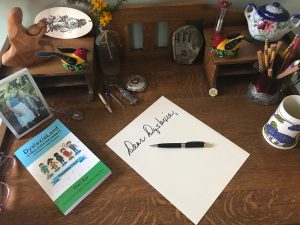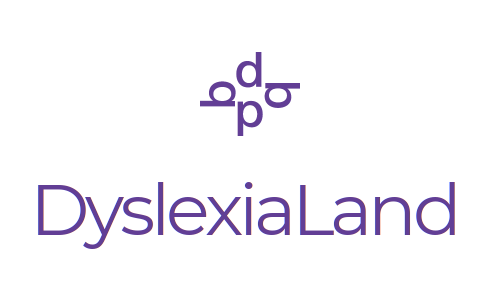Dear Dyslexia, A letter from the heart
It’s been more than a decade since we first met. Oh, yes, I caught fleeting glimpses of you years before we were formally introduced, but I didn’t know how to recognize you.
Long before my little boy was expected to effortlessly decipher words on a page, there

A letter from a mother’s heart, to the once mysterious member of the family.
were ghostly, momentary clues that just seemed like parts of my son’s personality unfolding. I didn’t know that when strung together they added up to reveal it was you, Dyslexia, in his intriguing brain.
*When he snuggled in to hear storybooks, he never cared about the words on the pages;
*When concepts like yesterday, today and tomorrow just dragged him down;
*When remembering the days of the week, or the months of the year, how to spell his name or recite the alphabet never seemed to matter much to him;
*When tying his shoes and knowing left from right seemed impossible tasks.
I delighted in all aspects of him, Dyslexia, but didn’t know that these positive attributes, too were related to you:
*His out-of-the-box creative thinking;
*His ability to take things apart and put them back together;
*The wonderful way he could put words together, speaking in a way that would touch the heart and show his spirit in ways that can never be learned from a book; *How his curiosity practically outlined his strong active body and vibrated like an energy field.
He always had an uncanny ability to navigate in the real world, remembering the way back on every hike, and in the complex world of human emotion, displaying kindness, empathy and insight far beyond his few years. After his first ride on a roller coaster he enthusiastically recreated the complex configuration, tracing every dip, curve, loop with his fingers in the air.
With his obvious intelligence and excitement about the world around him, we confidently sent him off to school with great expectations.
They were soon crushed.
I wish I had understood sooner it was you lurking about, stealing his confidence and undermining his joy in school.
“If only I’d known then what I know now.”
How often do parents say that about you, Dyslexia? Is it every single one of the parents of the 1 in 5 children with dyslexia? That would mean there are millions of parents now looking back and beating themselves up about then.
That coulda-woulda-shoulda nagging feeling that now every minute counts since we lost so very much time we can never make up. Looking back and wishing the timing was different does little good now; perhaps the gift is to pass along some little wisdom to other parents who may be making your acquaintance, but not even realizing it.
But I digress.
You, Dyslexia, began to show your power to separate my child from his friends in school. They continued their joyful exploration, while he experienced woeful frustration in the classroom, where academic tasks repeatedly revealed his weaknesses in memory, processing, and most of all, reading. The light dimmed in our darling, accomplished and enthusiastic little guy.
In kindergarten.
“Oh, He’s just all boy,” teachers said about his struggles. “Don’t worry, he’s a late bloomer.”
First grade, second grade, third grade: “Just be patient,” teachers said as he fell behind his classmates, as his joy at school extended only to his time outside the classroom—playing on the playground, digging in the garden, hanging out with his friends. “I’m sure he will catch up,” teachers said. “Don’t worry.” Again and again and again.
What if he doesn’t? I worried. What if they’re wrong?
Homework was a struggle, reading a mystery. Still, Dyslexia, no one uttered your name.
Finally, after I badgered the principal of the school long enough, she said my son could be tested. I had to address longstanding concerns with a Written Testing Request for an evaluation of my son’s academic performance, and an assessment of his mental, social and emotional health.
He would be examined to find out what was wrong with him because he didn’t fit into school.
After months of scheduling and testing and waiting, he was declared Disabled.
The Official Report indicated Specific Learning Disability with issues in Memory Processing, Auditory Processing, Sequencing and more. What it all meant remained a scary mystery. I’d never heard these words, never heard of these conditions.
The experts reported that there was something terribly wrong with his imperfect brain, conditions that would limit him in his ability to learn to read, write, spell, do math or ever function efficiently in the world. It was time to forget what we thought was his potential promise; it would not be fulfilled. It was agonizing to feel that this beautiful boy was so limited. But the experts had spoken and with all this evidence on paper, we believed them.
Dyslexia, you were never mentioned.
Because of this Specific Learning Disability, he was no longer just a student: He was declared a Special Education Student.
Shaken, frightened, but still trusting, my husband and I signed the documents and said our prayers. We handed him over to the Special Education Establishment. As we left the meeting, my husband looked at me and said, “Do these people know what they are doing?”
“Of course they do,” I assured him. “They’re experts in Special Education.”
Every day my son dutifully left his classroom and his classmates and reported to the Learning Center. But nothing much ever happened in the way of improving his skills in reading, writing or spelling, or his difficulties in processing. Twice a week he also worked with a private tutor—a former teacher—who finally admitted she was as baffled as we were about his difficulties in mastering academics. Every year, while his friends went off to camp, he stayed behind and attended summer school. That didn’t help either.
We agonized over his lack of progress in view of his obvious intelligence, and what we thought was adequate intervention. He was stuck in place in school. We were baffled, fearful, confused, and no one in the school system seemed to be able to help him do any better.
His fifth-grade teacher had a bit of a clue, remarking during a parent-teacher conference “His written work in no way reflects his knowledge or his abilities. It’s like there’s a block between his brain and his fingers.”
That kind and caring teacher didn’t know enough about you, Dyslexia, or your cousins Dysgraphia and Dyscalculia to make a proper introduction. No one in the school did. But as your presence grew stronger, so did our worry.
We spent many sleepless nights wondering what would happen to our charming and talented boy if he never learned to read, which seemed a distinct possibility. He grew older, taller, and brighter outside of school, accomplished as an athlete, a good friend, and a good thinker.
Despite those daily Special Education services at school, the expensive private tutoring intervention and the extra help at home, reading wasn’t happening. And didn’t seem like it ever would. But it wasn’t limited to reading: Spelling was a nightmare, and learning the multiplication table seemed impossible.
This Specific Learning Disability was a tough one, we admitted. Despite everything we knew to try, it was stronger than Public Education. In a time of No Child Left Behind, our boy was left in the dust with an ever-more standardized approach that demanded constant improvements of without institutional supports for his differences.
Then the unexpected happened. I attended a seminar about dyslexia to support a friend who sponsored the event. “Just come,” she cajoled, “you might learn something.” Walking in, I knew nothing about the subject at hand; walking out, I knew I had a lot to learn, but had one life-changing direction to follow. The baffling Specific Learning Disability we’d been trying to understand was actually you, Dyslexia, hiding in plain sight and no one in my educational community had a clue.
When we lifted the mysterious veil that surrounded you, we moved from a place of confusion and confounding to one of understanding and intrigue: So much to learn about; so many ways to help our boy.
Here’s the bottom line: It took lots of money, time and patience for him to learn to read. And it didn’t happen in public school. Instead, he learned to read when he was in seventh grade, still reading at a second-grade level after all those years in public school.
He learned to read thanks to private instruction where they knew, Dyslexia, that you require a special approach. The one-on-one teaching of an expensive, scientifically proven, sequential, structured, multi-sensory, one-on-one, highly effective reading process was matter-of fact and highly professional. With that intensive intervention, he made immediate, measurable progress; within weeks he was more confident and within months he made up five years of reading deficits.
His progress was neither a fluke nor a miracle; it was simply getting the right approach to reading after years of sitting in place with ineffective programs and with teachers who had no idea how to teach this boy.
Or anyone else like him. And it turns out, that numbers 1 in 5. Yes, Dyslexia, you’re pretty popular—not rare at all, just very misunderstood.
Learning to read was just the first step to this new sense of empowerment in school as we learned more about you, Dyslexia, and searched the Internet for everything we could find on the subject. And it was a lot. Too much, in fact to keep our heads from swirling with new information but our hearts were reassured with possibilities—and for the first time, Hope.
Back at school we developed a new vocabulary: Remediation; accommodations; project-based learning; focus on strengths and co-teaching became our buzzwords.
Our family now knows more about you, Dyslexia, than far too many teachers, administrators and policy-making politicians do.
With that knowledge, we have earned a seat at the table, a place in the community, to introduce others to you, Dyslexia; to provide awareness, resources and an action plan.
You seem like a perplexing mystery, Dyslexia, but in reality, you’re not that mysterious at all. In fact, you’re easy to spot when one knows the signs. You’re actually quite the Trickster, hiding in plain sight, almost taunting the unsuspecting to figure you out. And there are plenty of researchers across the nation working diligently to do just that. So much research, but so little of it is embraced by educators, applied in the typical classroom—or known by parents of struggling children.
After years of focused work by our entire family, our beautiful, talented, creative, industrious boy, graduated from high school—with honors, a four-year college scholarship and a feeling of great relief. He now makes his way in the world, finally free of the sense of continuous anxiety over impending failure in public school—let’s face it—a place where he never belonged, he was simply accommodated, expected to fit in with grudging supports that were trial and error at best.
Here’s a short list of what he can do: Hike the John Muir Trail; race a mountain bike in the Canadian Rockies; build an Adirondack chair; wire a lamp; barbeque a tri-tip; work as a car mechanic; engineer a backyard fire pit; support a sick friend through an emergency room visit; hit a baseball out of the park; learn skills by watching any number of You Tube videos, Ted Talks and television shows (anything on the Weather Channel, as well as favorites that include “Treehouse Masters,” “Forged in Fire,” and “Fast and Loud”); maintain friendships over time and distance; treat adults with respect and appreciation; videotape an award-winning presentation; master the complex Final Cut Pro video editing program; drive a stick shift or any number of fast and expensive vehicles in his job as a valet at a local internationally acclaimed resort; build a backyard fence; plan and landscape a drought-resistant succulent garden; apprentice himself to any number of successful entrepreneurs; make a case for just about anything he wants, using reason and charm; flip a car for ten times what he invested in it; plan any number of fun activities with his friends.
He can do this, Dyslexia, because he now owns you. Understands you. Explains you. Embraces you. Works around you.
And more. So much more.
And this is what he doesn’t do: Spell. Write much. Read what doesn’t matter to him. As he puts it: “I don’t want to be bothered by words and sentences and paragraphs and books and essays. I just don’t do them.”
Dyslexia, we have welcomed you into our lives and our family, and share your attributes with everyone we know. No longer a stranger in our midst, you’re now a familiar presence we embrace with ease, now that we have moved into your realm. We live together in a world apart, a place I call DyslexiaLand.
Most importantly, we’ve introduced you in all your ways to our bright and wonderful young man who embodies your characteristic strengths and weaknesses. A young man now, he understands how to communicate your presence in his life with others who may not know about you. When he says, “I have Dyslexia,” you should be proud. As we are. He is who he is not in spite of you, but because of you, Dyslexia—your demanding presence that balances risk and reward—and and we wouldn’t have it any other way.
Respectfully,
Cheri Rae
One Dyslexia Warrior Mom Among Ten Million And Determined to Make a Difference
Cheri Rae is the author of DyslexiaLand: A Field Guide for Parents of Children with Dyslexia (Olympus Press); contact her at Cheri@DyslexiaLand.com.


